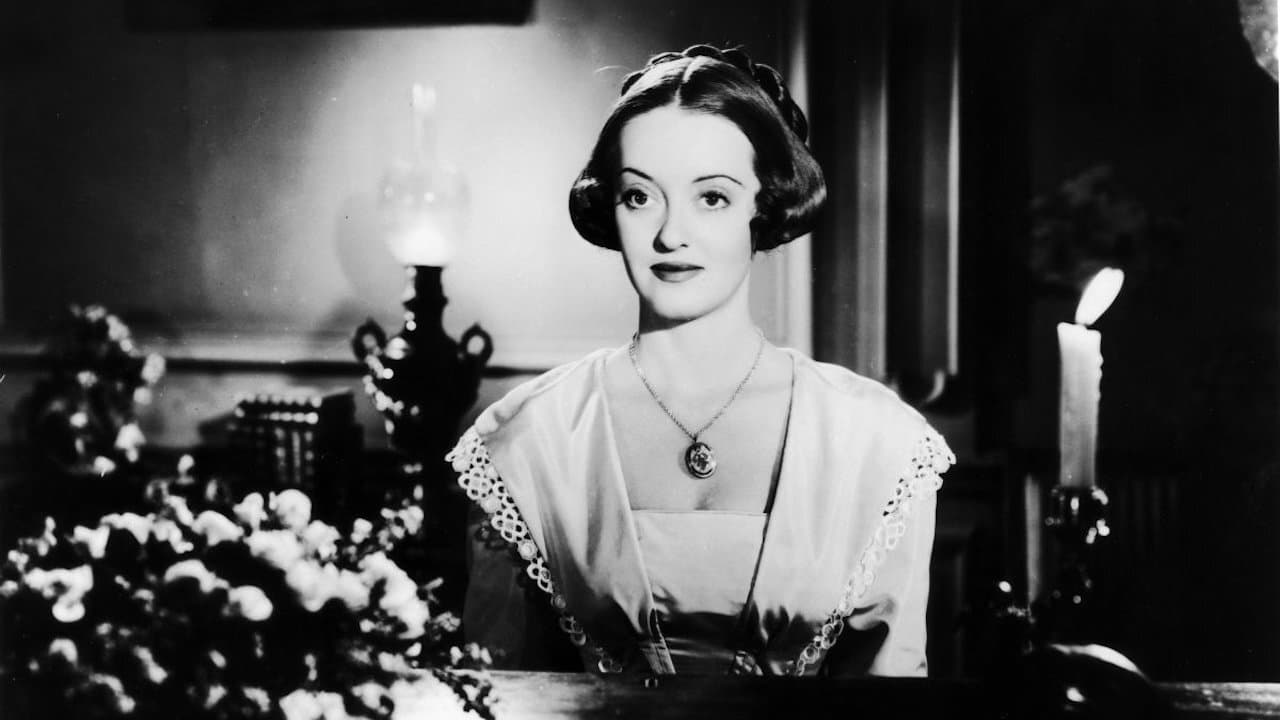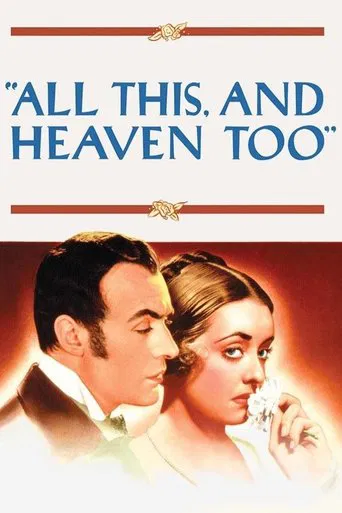

ALL THIS, AND HEAVEN TOO was not among Bette Davis's favorites of her work. She disliked the way director Anatole Litvak worked and felt her performance was too restrained as a result. I hope she lived long enough to see what a wonderful film this is: for it is her restraint that gives her character the emotional power it packs, especially as she is pitted against the over-emotional and unpredictable Duchesse de Praslin (Barbara O'Neill in an Oscar nominated performance).Davis is Henriette Deluzy-Desportes, a governess who is brought into the home of the Duc de Praslin to educate his four children. The tension between him and his wife is immediately seen; she is a selfish and jealous woman whose paranoia extends even to her own children. Almost from the day she enters the home Deluzy-Desportes is the object of this woman's hysterical outbursts. O'Neill is magnificent here, playing a woman who is supposed to be somewhat older than Davis when in fact she was two years younger.As for her husband (Charles Boyer, also magnificent), he never speaks a word to the governess that his wife could not here (and neither does Mlle Deluzy), but this does not stop her from accusing him of all manner of sins ranging from coldness to infidelity (and her behavior is a good enough reason for his coldness).Based on the first third of Rachel Field's book (worth a read too if you can find it), this is a long movie but there isn't a single moment wasted. Davis did herself proud here as she always did.
... View MoreThis movie has all sorts of weaknesses: it is at times extremely melodramatic, etc. I will leave it to others to detail all those faults.What this movie does well, and very well, is make a case for tolerance of moral difference. In the course of telling her story to her students, Bette Davis' character turns a bunch of priggish American girls into a group of compassionate young women. She shows, in other words, the power of a well-told story in developing compassion for others - just the sort of thing Warner Brothers did with its best movies. It makes a clear differentiation between France (of the 1840s, granted) and the United States and suggests very clearly that the US is, among other things, the land of such moral tolerance.Today, of course, as the US becomes ever more morally intolerant while France goes the other way that seems no little ironic. It also reminds at least this viewer that today's movie studios, lead by corporations and not individual owners, are much less committed to this sort of "movie with a message" than Warner Brothers was back in the day when it was in fact the product of Jack and Harry Warner, who had a very definite social agenda they wanted to promote.This movie is too long, it is sometimes excessively melodramatic. But it has its heart in the right place, and if you sit through it to the end, you realize that that is a place very relevant to today.Not a great movie, but a moving one.
... View MoreWhen students at a 19th century "School for Young Ladies" begin gossiping about the scandalous past of new French teacher Bette Davis (as as Henriette Deluzy-Desportes), she decides to tell them the whole "true story" about what really happened In flashback, lonely Mademoiselle Davis sails from England to France, where she will apply, and be accepted, as governess to the four children of Charles Boyer and Barbara O'Neil (as the Duc and Duchesse de Praslin) - tearful June Lockhart (as Isabelle), precocious Virginia Weidler (as Louise), cute Ann Todd (as Berthe), and sickly Richard Nichols (as Reynald).Davis immediately connects with the beautiful, love-starved children, who are suffering under the apparent dissolution of their parents' marriage. Monsieur Boyer has fallen quite obviously out of love with Madame O'Neil, which has made his wife unstable. Alternately arguing and sobbing, O'Neil loves Boyer blindly, and sees Davis as a threat. As you might imagine, she is correct Watching the restrained relationship develop between Davis and Boyer, while O'Neil becomes more and more miserable, is great fun. The story, based on Rachel Field's hit novel, succeeds in keeping the passion subdued.Magnificently mounted by the Warner Bros. studio, "All This, and Heaven Too" made the "Academy Awards" top ten, and scored additional nominations for Ernest Haller's cinematography and "Supporting Actress" (O'Neil). Davis was nominated for "Best Actress" in the more recently released "The Letter" (1940), or she would have been nominated for this performance. She was obviously on a roll, and capable of creating incredibly distinct characters. Boyer is at his best. Mr. Litvak's direction of actors and sets is smooth, staid and stately, with the "separation of bedrooms" sequence beautifully realized.********* All This, and Heaven Too (7/4/40) Anatole Litvak ~ Bette Davis, Charles Boyer, Barbara O'Neil, June Lockhart
... View MoreI am having a hard time finding the words to explain just how much I detested this movie. The historical trial of Henriette Deluzy-Desportes and the Duc de Praslin is a tragic and compelling story that, I feel, had the potential to be a fantastic film, but failed. Although the cinematography certainly had something to say for itself, it in no way could make up for the terrible structure of the film, the badly written script and most of all the horrendously overacted characters. The worst of them were the Duc's children who were so over-the-top-corny and sickeningly fake that it was almost painful to watch.In conclusion, this film left me feeling nothing more than irritated and profoundly disappointed.
... View More